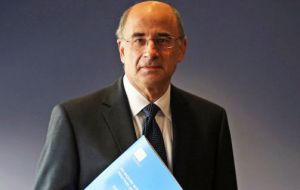MercoPress. South Atlantic News Agency
Law to regulate UK press: PM Cameron against; Clegg and Miliband in favour
 Lord Justice Brian Leveson reported on his inquiry which laid bare the cosy ties between British leaders, police chiefs and press barons.
Lord Justice Brian Leveson reported on his inquiry which laid bare the cosy ties between British leaders, police chiefs and press barons. Prime Minister David Cameron rejected the idea of a law to regulate the British press risking a split in his government after an inquiry advised legal backing for a watchdog to police the sometimes outrageous conduct of newspapers
Opposing an independent regulator enshrined in law will delight the British press ahead of the 2015 election but may raise concern inside the coalition government that Cameron lacks the mettle to stand up to media barons such as Rupert Murdoch.
Cameron said he was wary of writing press regulation into law, a snub to the inquiry he ordered in July last year after public outrage at revelations that one of Murdoch’s tabloids hacked the phone messages of a 13-year-old murder victim.
“The issue of principle is that for the first time we would have crossed the Rubicon of writing elements of press regulation into the law of the land,” Cameron told Parliament, watched from the gallery by victims of phone-hacking who have campaigned for tougher rules to police Britain’s recalcitrant media.
“I’m not convinced at this stage that statute is necessary,” Cameron said, just hours after Lord Justice Brian Leveson reported on his inquiry which laid bare the cosy ties between British leaders, police chiefs and press barons.
Presenting his 1.987-page report opposite the House of Commons, Leveson said he had no intention of undermining three centuries of press freedom but that the press had at times “wreaked havoc with the lives of innocent people” and was sometimes guilty of “outrageous” behaviour.
Leveson said it was essential that there should be legislation to underpin a new independent, self-regulatory body for the press that would be scrutinized by the broadcast regulator Ofcom and have the power to impose fines of up to one percent of turnover up to a maximum of one million pounds.
“The ball moves back into the politicians’ court: they must now decide who guards the guardians,” Leveson said.
The behaviour of Britain’s tabloid press has come under increasing scrutiny in recent years. While British newspapers were unwilling to report on King Edward VIII’s affair with American divorcee Wallis Simpson in the 1930s, their conduct has since become much less restrained in the battle for readers.
As competition intensified, the tabloids turned on the private lives of the royal family, culminating in feverish coverage of Princess Diana, hounded by paparazzi as her marriage to Prince Charles collapsed.
At one point in the early 1990s, a government minister warned the tabloid press that they were “drinking in the last chance saloon”. At about the same time the Press Complaints Commission was set up, a self-regulating watchdog now deemed to have failed.
“I know of no organized profession, industry or trade in which the serious failings of the few are overlooked or ignored because of the good done by the many,” Leveson said.
While Cameron rejected immediate legislation, the leader of the opposition Labour Party said he supported Leveson’s proposals as did Cameron’s coalition partner, Deputy Prime Minister Nick Clegg.
“There can be no more last chance saloons,” said Labour leader Ed Miliband, opening up the prospect of possible defeat in Parliament for Cameron if Labour joined forces with supporters of tougher rules inside the coalition parties.
In a sign of a split at the very heart of government, Clegg said legislation was the only real way to establish a new self-regulatory body for the press.
“Changing the law is the only way to give us all the assurance that the new regulator isn’t just independent for a few months or years, but is independent for good,” Clegg said.




Top Comments
Disclaimer & comment rules-

-

-

Read all commentsR.Murdoch
Nov 30th, 2012 - 08:53 pm 0where are you ** ??
Censorship!
Nov 30th, 2012 - 08:56 pm 0Dictatorship!
The beginning of the end for UK's civil liberties!
The end of the beginning of GB's new indoctrination system!
Geeeeeeeee....... I'm beginning to sound as the Turnipsw in here ;-)
I am very hopeful to read “ Clarin ” comments here again.
Nov 30th, 2012 - 09:15 pm 0Commenting for this story is now closed.
If you have a Facebook account, become a fan and comment on our Facebook Page!